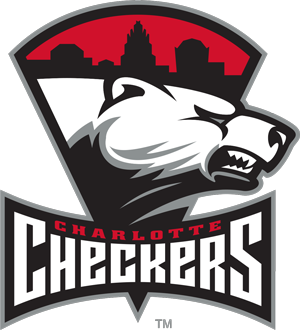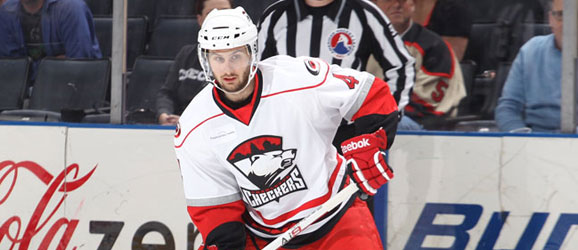Of the four defensemen in the Hurricanes’ system expecting to turn pro next season, it’s possible that Danny Biega may end up having the easiest adjustment period.
That’s partially due to his age – as the only member of the incoming freshman class to complete four years of college, he’ll be 22 by the time next season starts. For the sake of comparison, the Checkers’ Rasmus Rissanen, who will be entering his third professional campaign, is only two months older. Ryan Murphy, Carolina’s first-round pick in 2011 who will also be turning pro next season, will still be 20 on opening night.
That said, Biega has always had a leg up on his competition thanks to a level of physical conditioning that first turned heads at the 2010 NHL Draft combine, helping the Canes choose him with their third-round selection. At that event, he finished in the top 10 in several different tests, including the first overall spots in grip strength, bench press and push/pull strength.
“From a strength standpoint, there’s no transition for him,” said Checkers coach Jeff Daniels, who used Biega for four total games at the end of last season, including three in the playoffs.
As far as what he’s done on the ice, Biega, who checks in at a stocky 6-foot-0 and 200 pounds, had a rude awakening to his professional career upon joining Charlotte at the end of Harvard’s season in March. He suffered a concussion on one of his first shifts, causing him to miss over a month of game action.
“Injuries are going to happen and you can’t dwell over them,” said Biega. “I had a slight one but I’m feeling great now. I’m in the best shape of my life.”
“It was a tough break for him getting hurt in the first game, but he wanted to get back and pushed himself hard to get back in the lineup,” said Daniels.
Despite his rough start, Biega looked no worse for the wear upon his return, essentially making his debut during a tough playoff series. He picked up two assists in his three postseason games against Oklahoma City, both of which came in the Checkers’ 6-1 victory in Game 3.
Needless to say, that’s left him with a better impression than he may have otherwise had if his experience was limited to those those first few shifts prior to the injury.
“Back in college it seemed faster but it really wasn’t – there was just a lot of people running around and a lot of disorganization,” he said. “Here (at the Hurricanes’ development camp) the game is slowed down in a sense that players are always in their position and you can rely on people a lot more. My first impression going into the AHL was that this is great and this is awesome because it’s that much easier.”
Though a handful of veteran Checkers defensemen from last season will not be back, experienced players like Brett Bellemore, Michal Jordan and Rissanen all have a chance of returning, while the newly-signed Matt Corrente and Mark Flood could also occupy spots and make things more difficult for Biega and the rest of the rookie influx.
Training camp will go a long way towards determining who plays with which team and in what role, but Daniels already seemed to have a comfort level with Biega, who he considers capable of contributing at both ends of the rink, as evidenced by two seasons at Harvard in which he averaged at or near a point per game.
“He’s a big strong kid that can skate, move the puck and shoot the puck hard,” said Daniels. “We’ll see where he fits as far as power play time, but it’s a good option to have.”






